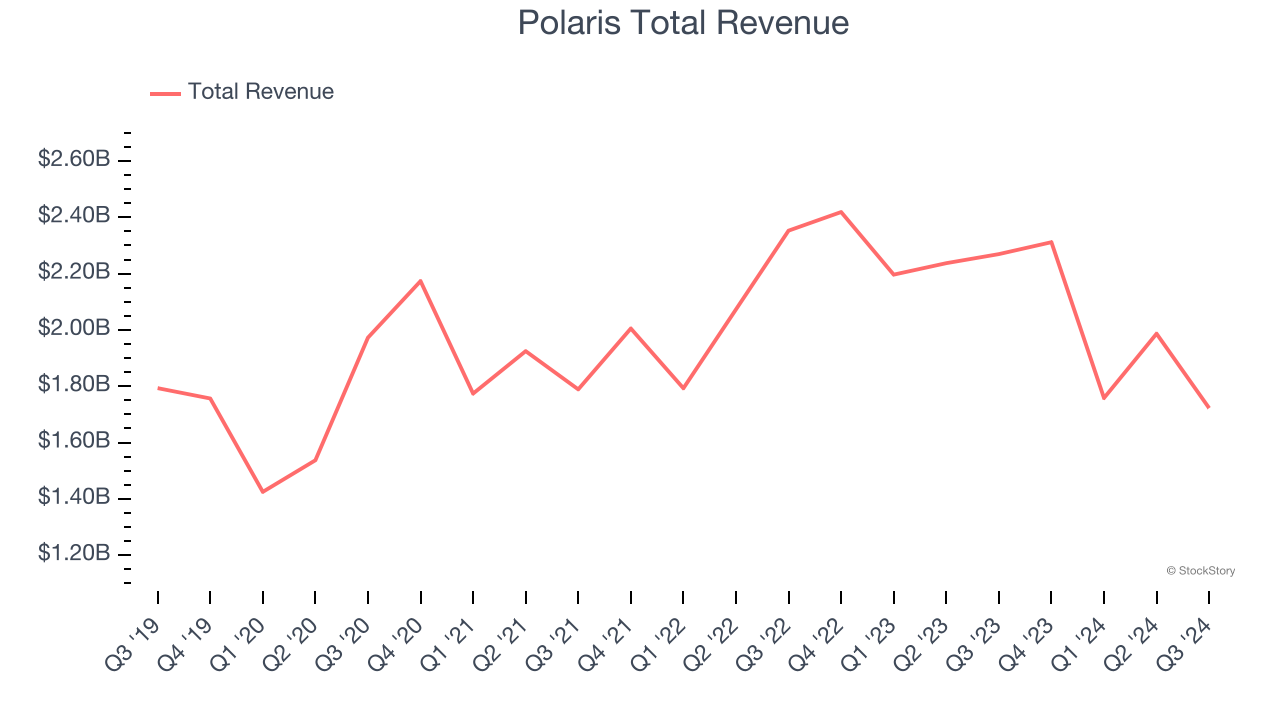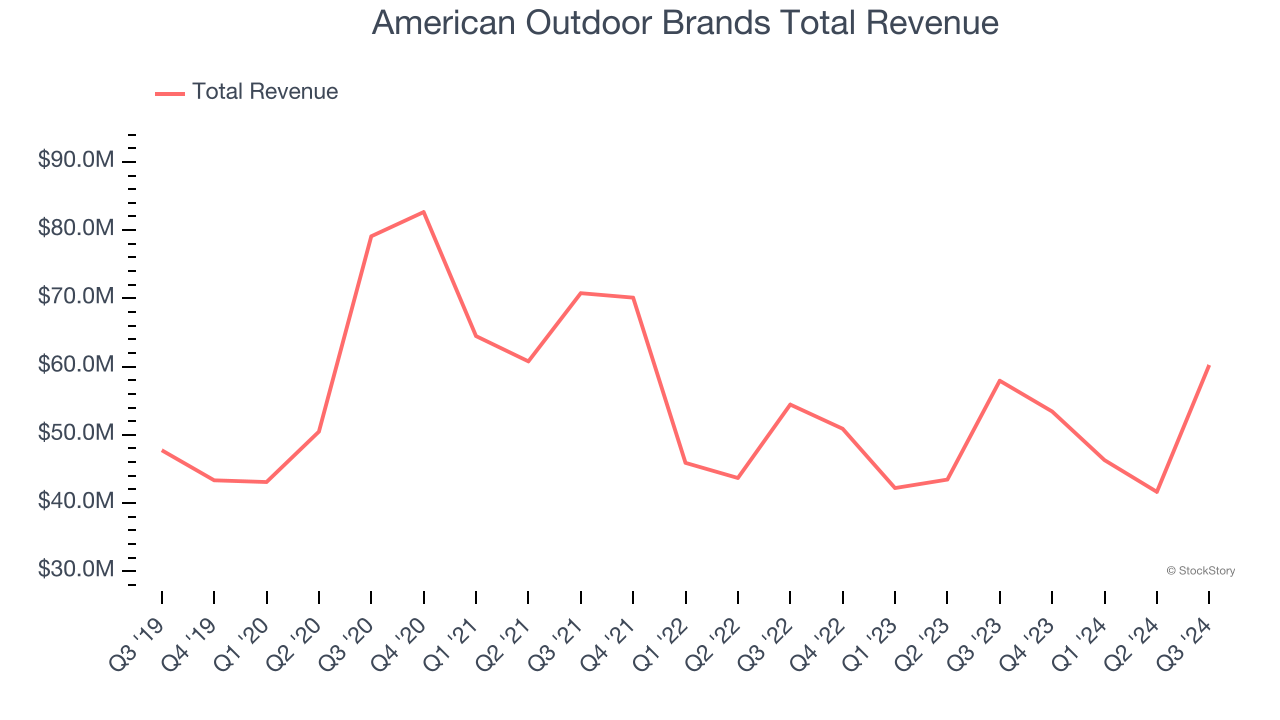
As the Q3 earnings season wraps, let’s dig into this quarter’s best and worst performers in the leisure products industry, including Polaris (NYSE: PII) and its peers.
Leisure products cover a wide range of goods in the consumer discretionary sector. Maintaining a strong brand is key to success, and those who differentiate themselves will enjoy customer loyalty and pricing power while those who don’t may find themselves in precarious positions due to the non-essential nature of their offerings.
The 14 leisure products stocks we track reported a slower Q3. As a group, revenues beat analysts’ consensus estimates by 0.6% while next quarter’s revenue guidance was 1.1% below.
Amidst this news, share prices of the companies have had a rough stretch. On average, they are down 5.2% since the latest earnings results.
Polaris (NYSE: PII)
Founded in 1954, Polaris (NYSE: PII) designs and manufactures high-performance off-road vehicles, snowmobiles, and motorcycles.
Polaris reported revenues of $1.72 billion, down 24.1% year on year. This print fell short of analysts’ expectations by 2.8%. Overall, it was a disappointing quarter for the company with a significant miss of analysts’ EPS estimates and a miss of analysts’ EBITDA estimates.

Unsurprisingly, the stock is down 29.1% since reporting and currently trades at $56.87.
Read our full report on Polaris here, it’s free.
Best Q3: American Outdoor Brands (NASDAQ: AOUT)
Spun off from Smith and Wesson in 2020, American Outdoor Brands (NASDAQ: AOUT) is an outdoor and recreational products company that offers firearms and firearm accessories.
American Outdoor Brands reported revenues of $60.23 million, up 4% year on year, outperforming analysts’ expectations by 13.1%. The business had an incredible quarter with a solid beat of analysts’ EPS estimates and an impressive beat of analysts’ EBITDA estimates.

American Outdoor Brands pulled off the highest full-year guidance raise among its peers. The market seems happy with the results as the stock is up 47.8% since reporting. It currently trades at $16.11.
Is now the time to buy American Outdoor Brands? Access our full analysis of the earnings results here, it’s free.
Weakest Q3: Ruger (NYSE: RGR)
Founded in 1949, Ruger (NYSE: RGR) is an American manufacturer of firearms for the commercial sporting market.
Ruger reported revenues of $122.3 million, up 1.2% year on year, falling short of analysts’ expectations by 10.8%. It was a disappointing quarter as it posted a significant miss of analysts’ EBITDA and EPS estimates.
Ruger delivered the weakest performance against analyst estimates in the group. As expected, the stock is down 12.7% since the results and currently trades at $35.61.
Read our full analysis of Ruger’s results here.
Acushnet (NYSE: GOLF)
Producer of the acclaimed Titleist Pro V1 golf ball, Acushnet (NYSE: GOLF) is a design and manufacturing company specializing in performance-driven golf products.
Acushnet reported revenues of $620.5 million, up 4.6% year on year. This number was in line with analysts’ expectations. Overall, it was a strong quarter as it also put up a solid beat of analysts’ adjusted operating income estimates and an impressive beat of analysts’ EPS estimates.
The stock is up 15.3% since reporting and currently trades at $73.01.
Read our full, actionable report on Acushnet here, it’s free.
Solo Brands (NYSE: DTC)
Started through a Kickstarter campaign, Solo Brands (NYSE: DTC) is a provider of outdoor and recreational products.
Solo Brands reported revenues of $94.14 million, down 14.7% year on year. This print beat analysts’ expectations by 1.7%. More broadly, it was a mixed quarter as it also produced an impressive beat of analysts’ adjusted operating income estimates but a significant miss of analysts’ EPS estimates.
The stock is down 27.8% since reporting and currently trades at $1.05.
Read our full, actionable report on Solo Brands here, it’s free.
Market Update
Thanks to the Fed's series of rate hikes in 2022 and 2023, inflation has cooled significantly from its post-pandemic highs, drawing closer to the 2% goal. This disinflation has occurred without severely impacting economic growth, suggesting the success of a soft landing. The stock market has thrived in 2024, spurred by recent rate cuts (0.5% in September and 0.25% each in November and December), and a notable surge followed Donald Trump's presidential election win in November, propelling indices to historic highs. Nonetheless, the outlook for 2025 remains clouded by the pace and magnitude of future rate cuts as well as potential changes in trade policy and corporate taxes once the Trump administration takes over. The path forward is marked by uncertainty.
Want to invest in winners with rock-solid fundamentals? Check out our Hidden Gem Stocks and add them to your watchlist. These companies are poised for growth regardless of the political or macroeconomic climate.
Join Paid Stock Investor Research
Help us make StockStory more helpful to investors like yourself. Join our paid user research session and receive a $50 Amazon gift card for your opinions. Sign up here.





